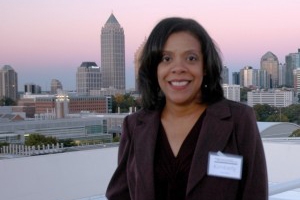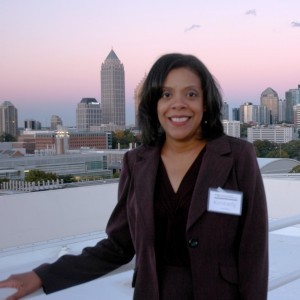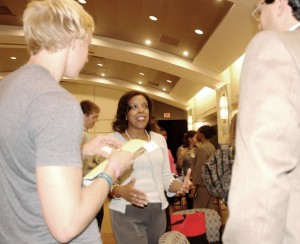
 Kimberly (Brown) Sanders, CE ’90, always thought like a civil engineer – even when she was courting ambitions of becoming a news anchor.
Kimberly (Brown) Sanders, CE ’90, always thought like a civil engineer – even when she was courting ambitions of becoming a news anchor.
“I liked to ask questions, to find out ‘what will happen if I do this?’ so, in high school, being a newscaster looked like it would be a good career,” says the Augusta, Georgia native, now a state and local government client service manager for Weston Solutions, Inc., a Norcross-based engineering firm.
“Then I researched engineering– saw what the demand was for women engineers – and I didn’t give it another thought.”
That doesn’t mean she had all of the answers, however; forming a successful career out of her youthful curiosity took some finessing – exactly what she found at CEE.
“Before I started my freshman year, I attended a Georgia Tech summer program for rising senior high school students interested in engineering called the Minority Introduction to Engineering (MITE), where every type of engineering was introduced,” she said.
“And civil engineering just felt right. I could see the things that civil engineering impacts– roads/bridges, buildings, land and water. That meant a lot to me, because if I was going to go through an entire curriculum to get my degree, it couldn’t all be abstract.”
Of course the civil engineering curriculum did have its share of abstract concepts, mathematical equations, and theoretical constructs. It wasn’t all graspable at first glance. In particular, the first two years of Sanders’ program were full of grueling foundational classes that were heavy on theory. Those courses definitely put some sweat on her brow.
“But I could always imagine, in my own mind, where it was going, so I could tolerate the theory.  I was going to learn how to make the air the water and the earth cleaner, so there was a reason to persist,” she said. “I just needed something tangible to focus my studies. I needed to see there was a point.”
I was going to learn how to make the air the water and the earth cleaner, so there was a reason to persist,” she said. “I just needed something tangible to focus my studies. I needed to see there was a point.”
Many experiences – in and out of the classroom – encouraged her along the way.
“I remember taking a geotechnical class with Dr. [Glenn] Rix. It was his first year teaching and my first year at Tech. He did an experiment where he simulated the liquefaction in the soil during an earthquake. I knew there was a lot of theory to learn behind that, but the only thing I could think was: ‘That was really cool. Now, I know what happens in the subsurface during an earthquake. How cool!”
A member of the student chapter of the American Society of Civil Engineers (ASCE), Sanders participated in ASCE’s Concrete Canoe competition, which enlisted CEE students to build a floatable vessel, made of concrete, on a strict budget and timeline. She also joined CEE’s cylinder-breaking team, which challenged students from different colleges to compete to build the most durable concrete cylinders.
Perhaps the most challenging test of her civil engineering abilities came during a summer internship, when she did concrete slump testing on Georgia Department of Transportation projects. She was in charge of testing the batches of concrete when they arrived on site, making sure each batch met specifications before it was poured.
“If it didn’t look right – was not strong enough, or if it didn’t have the specific properties we needed – I was the person who had to put a halt to its use,” she says. “I wasn’t about to go tell the truck driver that his load was being rejected, so I went to the site supervisor to let him handle it. For an intern, it was a little scary at first, but I quickly got used to it.”
To meet Sanders today, it is hard to imagine her ever being reticent. Energetic would more aptly describe this modern businesswoman, wife and mother of one. She attributes her positive, energetic attitude to the strong connection she feels with her work.
“I have the opportunity to help clients – state and local governments –solve their problems and find solutions for their complex issues in areas such as construction, land development and environmental. . To do that, it’s important to know the engineering behind their requests. I don’t do the actual engineering work anymore, but I know what goes into it and I know what questions to ask.”
More importantly, she has a lot more answers.
